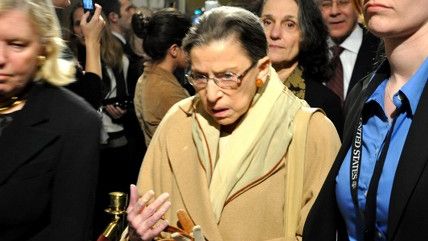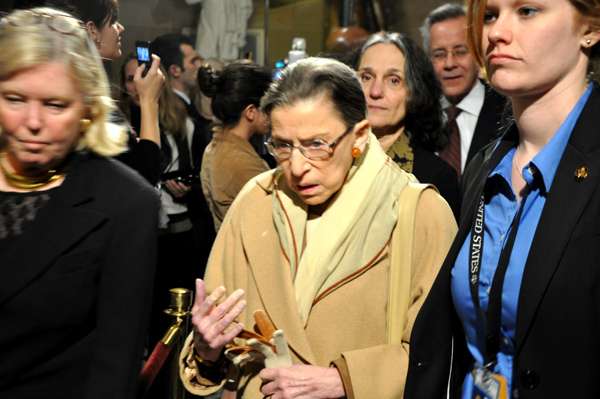Ruth Bader Ginsburg "Regrets" Her Remarks on Donald Trump, But Should She?
A little transparency about the political opinions of Supreme Court justices isn't the worst thing in the world.


Supreme Court Justice Ruth Bader Ginsburg issued a statement this morning regarding the controversial comments she made in recent interviews with the New York Times, the Associated Press, and CNN about presumptive Republican presidential nominee Donald Trump.
Ginsburg's statement reads in full:
On reflection, my recent remarks in response to press inquiries were ill-advised and I regret making them. Judges should avoid commenting on a candidate for public office. In the future I will be more circumspect.
In the interviews in question, Ginsburg described Trump as a "faker" and said she "can't imagine what the country would be" if he were elected president. She also (apparently) joked about moving to New Zealand in the event of a Trump Administration.
Criticism of the justice known affectionately by her fans as "Notorious RBG" has poured in from across the political spectrum, with the New York Times editorial board writing that Ginsburg "needs to drop the political punditry and the name-calling" and that "Washington is more than partisan enough without the spectacle of a Supreme Court justice flinging herself into the mosh pit." Paul Waldman writes at The Week that Ginsburg's "breach of decorum" was understandable because Trump is a "profound threat." But, Waldman cautions, "If you're going to discard a valuable norm, it can't just be because you're exceedingly mad."
Other outlets got more specific about the potential pitfalls of a Supreme Court justice expressing a political opinion, such as the Los Angeles Times editorial board, which notes that while Supreme Court justices are not bound to follow the Code of Conduct for United States Judges, Chief Justice John Roberts has said, "All members of the court do in fact consult the Code of Conduct in assessing their ethical obligations," which does not allow for judges to "publicly endorse or oppose a candidate for public office."
For its part, the Wall Street Journal editorial board wrote that Ginsburg's candor is a case of "overt partisanship from a judge [which] should disqualify her from hearing any case related to the presidential election—such as voter ID laws," while the USA Today editorial board fretted that Ginsburg "places in jeopardy any pretension of fairness toward that candidate's administration, should [Trump] win."
The reaction from the right — that Ginsburg's admitted distaste for Trump disqualifies her from ruling on anything related to a potential Trump administration — is fairly predictable, and as the LA Times points out, it is "the appearance of impropriety" that is so potentially problematic.
While it's understandable that judges must be required to remain impartial on a personal basis when it comes to adjudicating cases brought before them, there's something strange about requiring human beings who (for the most part) will live and work in Washington, DC at the same job for decades to not have any political identities.
Supreme Court justices are political appointees who make their personal politics known on nearly every decision. Justice is supposed to be blind, and justices are supposed to be merely interpreting the law, but does anyone really believe every Supreme Court justice hasn't at some point held some personal or political enmity toward a president of the opposite party, and that one of their decisions might have been affected as a result?
It's certainly advisable for the Supreme Court to avoid becoming as nakedly partisan as say, Congress. But that's supposedly why justices have lifetime appointments, to shield them from outside political influence. To act as if justices are like sequestered jurors — trapped in their hotels and blind to the outside world to maintain impartiality — is silly.
A little transparency and frankness from the mysteriously-cloaked figures who appear before the public only a few times a year, in a courtroom with no cameras, isn't necessarily the worst thing in the world.


Show Comments (112)